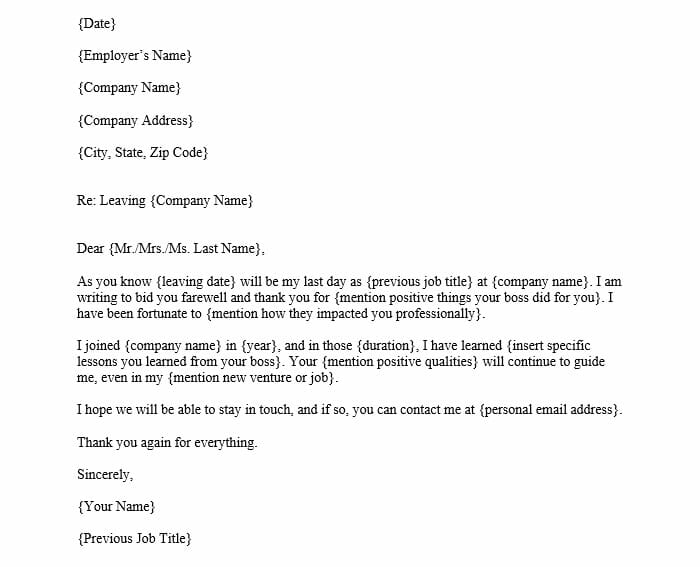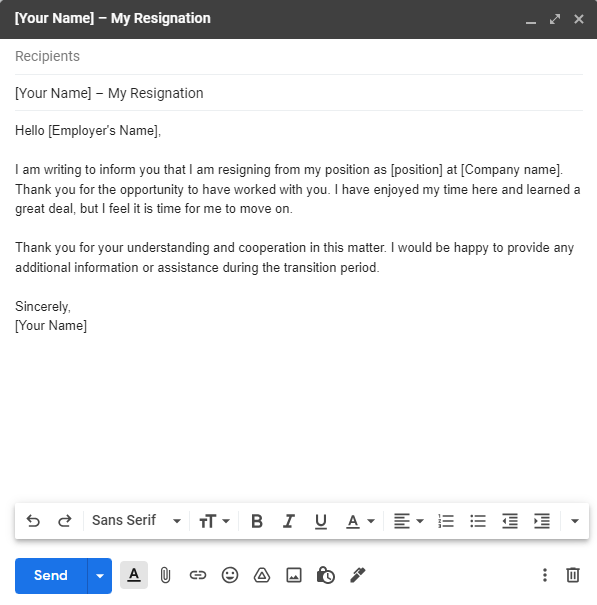How To Tell Your Boss You Are Leaving

Navigating the professional landscape often requires making difficult decisions, and resigning from a job ranks high on that list. Knowing how to communicate this decision to your supervisor can significantly impact your reputation and future career prospects.
The resignation conversation, while potentially uncomfortable, is a crucial step in maintaining professional relationships and ensuring a smooth transition. Experts emphasize preparation, clarity, and respect as key elements for a successful resignation process.
Preparing for the Conversation
Before scheduling a meeting with your manager, it's essential to have a clear understanding of your next steps. This includes securing a new job offer, determining your desired departure date, and preparing a resignation letter. Having these details solidified demonstrates professionalism and preparedness.
Consider the timing of your announcement. Avoid delivering the news right before a major deadline or during a particularly stressful period for your team. Choose a time when your manager is likely to be available and receptive to the conversation.
Rehearse what you want to say. Practice articulating your reasons for leaving, expressing gratitude for the opportunities you've had, and reaffirming your commitment to a smooth handover. This practice can help you stay calm and focused during the actual conversation.
Delivering the News
Schedule a private, face-to-face meeting with your manager. Email or a phone call should be reserved for situations where an in-person conversation is impossible. Starting with a direct, yet respectful, statement is advisable.
“I wanted to schedule this meeting to let you know that I’ve made the decision to resign from my position at [Company Name],” is a professional and straightforward opening. Follow this statement with a brief explanation of your reasons, avoiding overly negative or critical comments.
Express gratitude for the opportunities and experiences you've gained during your time at the company. Highlighting positive aspects of your employment demonstrates professionalism and reinforces your appreciation for the organization.
The Resignation Letter
A formal resignation letter serves as a written record of your departure and provides an opportunity to reiterate your commitment to a smooth transition. It should include your name, the date, your manager's name, your position, your last day of employment, and a brief expression of gratitude.
Keep the letter concise and professional. Avoid including lengthy explanations or negative comments. Proofread carefully to ensure there are no grammatical errors or typos.
Provide a copy of your resignation letter to your manager during or immediately after the verbal conversation. This ensures they have a formal record of your departure.
Ensuring a Smooth Transition
Offer your assistance in training your replacement and documenting your responsibilities. A smooth handover minimizes disruption to the team and reflects positively on your professionalism. Be proactive in identifying key tasks and projects that need to be addressed before your departure.
Maintain a positive attitude and remain engaged in your work until your last day. Avoid becoming disengaged or neglecting your responsibilities. This demonstrates respect for your colleagues and the company.
According to a recent study by Gallup, employees who feel valued and supported during their transition are more likely to maintain positive relationships with their former employers. This can be beneficial for future networking and career opportunities.
Potential Impacts and Considerations
The manner in which you resign can have lasting implications for your professional reputation. A graceful and professional departure can open doors for future collaborations and references.
Conversely, a poorly handled resignation can damage your reputation and potentially hinder your career prospects. Maintaining professionalism and respect throughout the process is crucial.
Leaving a job is a significant decision, but by approaching the resignation process with careful planning, clear communication, and a commitment to a smooth transition, you can navigate this transition successfully and maintain positive professional relationships.






:max_bytes(150000):strip_icc()/2060865a-a00dd037c25547df8a83c13bb57cd695.jpg)







:max_bytes(150000):strip_icc()/how-to-tell-your-boss-you-re-quitting-your-job-2063035_FINAL-5b88037cc9e77c002cc6f46c.png)



